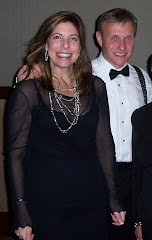 d the Daily Insight. A couple of Wednesdays ago, the article, "Posture Patterns" talked about observing people's postures and noting the way they sit, stand and move. The author then goes onto say that observing [poor] posture is the first step toward change. Hmm, this sounds somewhat familiar. This "observing" also works for people who have food issues. During sometime in the life of a "dieter" he or she has purposely observed a "normal" person eating.
d the Daily Insight. A couple of Wednesdays ago, the article, "Posture Patterns" talked about observing people's postures and noting the way they sit, stand and move. The author then goes onto say that observing [poor] posture is the first step toward change. Hmm, this sounds somewhat familiar. This "observing" also works for people who have food issues. During sometime in the life of a "dieter" he or she has purposely observed a "normal" person eating.My eating issues are two-fold; I eat quickly, and I can eat a lot. Nobody warned me that when you
 work in an Emergency Room, you sometimes don't eat during your 8 or 12 hour shift. You drink lots of coffee, you have bad breath, you chew a lot of gun, but you don't eat. During my first couple of months in the ER, I learned this lesson the hard way. I also learned to hold my bladder for 8-10 hours straight, but we can babble about that later. During a busy shift, I sometimes got lucky and would scarf down something while my patient was getting an X-ray or
work in an Emergency Room, you sometimes don't eat during your 8 or 12 hour shift. You drink lots of coffee, you have bad breath, you chew a lot of gun, but you don't eat. During my first couple of months in the ER, I learned this lesson the hard way. I also learned to hold my bladder for 8-10 hours straight, but we can babble about that later. During a busy shift, I sometimes got lucky and would scarf down something while my patient was getting an X-ray or  some other test. To this day, I need to remind myself to slow down, especially because I now know the rule -- it takes 20 minutes from the time you start eating for your brain to figure out that you are full. So, it makes sense that if you eat more slowly, you will have eaten less by the time your body realizes it's full. This is where observing others helps. During a meal, if I find myself speeding along, I slow down and keep pace with the other diners.
some other test. To this day, I need to remind myself to slow down, especially because I now know the rule -- it takes 20 minutes from the time you start eating for your brain to figure out that you are full. So, it makes sense that if you eat more slowly, you will have eaten less by the time your body realizes it's full. This is where observing others helps. During a meal, if I find myself speeding along, I slow down and keep pace with the other diners.Feeling full, to me, just means that my stomach is pushing against my pants. It doesn't mean that I'
 m supposed to stop eating. Well, I know I'm supposed to stop eating, but sometimes I choose to ignore this signal. I remember seeing a news clip where they interviewed men and women who are 80 years plus, still in good health and leading vibrant lives. One practice they all had in common was that they ate until they were satisfied, not full. I know how to do this and I know how this feels.... great. Feeling satisfied is so much better than feeling full. Sometimes when Marc and I are out to dinner, we share an entree. Other times, I'll put a "sizeable tasting" on his plate (to get it off of mine), but more times than not, I have to depend on my own willpo
m supposed to stop eating. Well, I know I'm supposed to stop eating, but sometimes I choose to ignore this signal. I remember seeing a news clip where they interviewed men and women who are 80 years plus, still in good health and leading vibrant lives. One practice they all had in common was that they ate until they were satisfied, not full. I know how to do this and I know how this feels.... great. Feeling satisfied is so much better than feeling full. Sometimes when Marc and I are out to dinner, we share an entree. Other times, I'll put a "sizeable tasting" on his plate (to get it off of mine), but more times than not, I have to depend on my own willpo wer to leave the food. Even when I'm feeling satisfied and/or full, the desire to pick can be very strong.
wer to leave the food. Even when I'm feeling satisfied and/or full, the desire to pick can be very strong.Over these last three decades, I've learned all the tricks to eating slowly, eating consciously, being in the moment and leaving food. Years ago I was out to lunch with my daughter [who was then about 5 or 6 years old] when she picked up the salt and pepper shakers and sprinkled her chocolate chi
 p pancakes. She was talking to her pancakes telling them how much she loved them, and how tempted she was to "gobble them all up", but that if she ate more of them she would get a belly ache. When I asked her wh
p pancakes. She was talking to her pancakes telling them how much she loved them, and how tempted she was to "gobble them all up", but that if she ate more of them she would get a belly ache. When I asked her wh ere she had learned this, she said that she had figured it out by herself. Maybe I should have been observing her eating habits for the past couple of years and not her table manners........
ere she had learned this, she said that she had figured it out by herself. Maybe I should have been observing her eating habits for the past couple of years and not her table manners........Moral of the story: Think back to the days when you were a kid and ate to fuel your body. Back then we understood the repercussions of feeling too full and knew intuitively that full meant stop ... even when we were 5 or 6 years old.
Quote of the Day: "The gem cannot be polished without friction, nor man perfected without trials" --Chinese Proverb






No comments:
Post a Comment